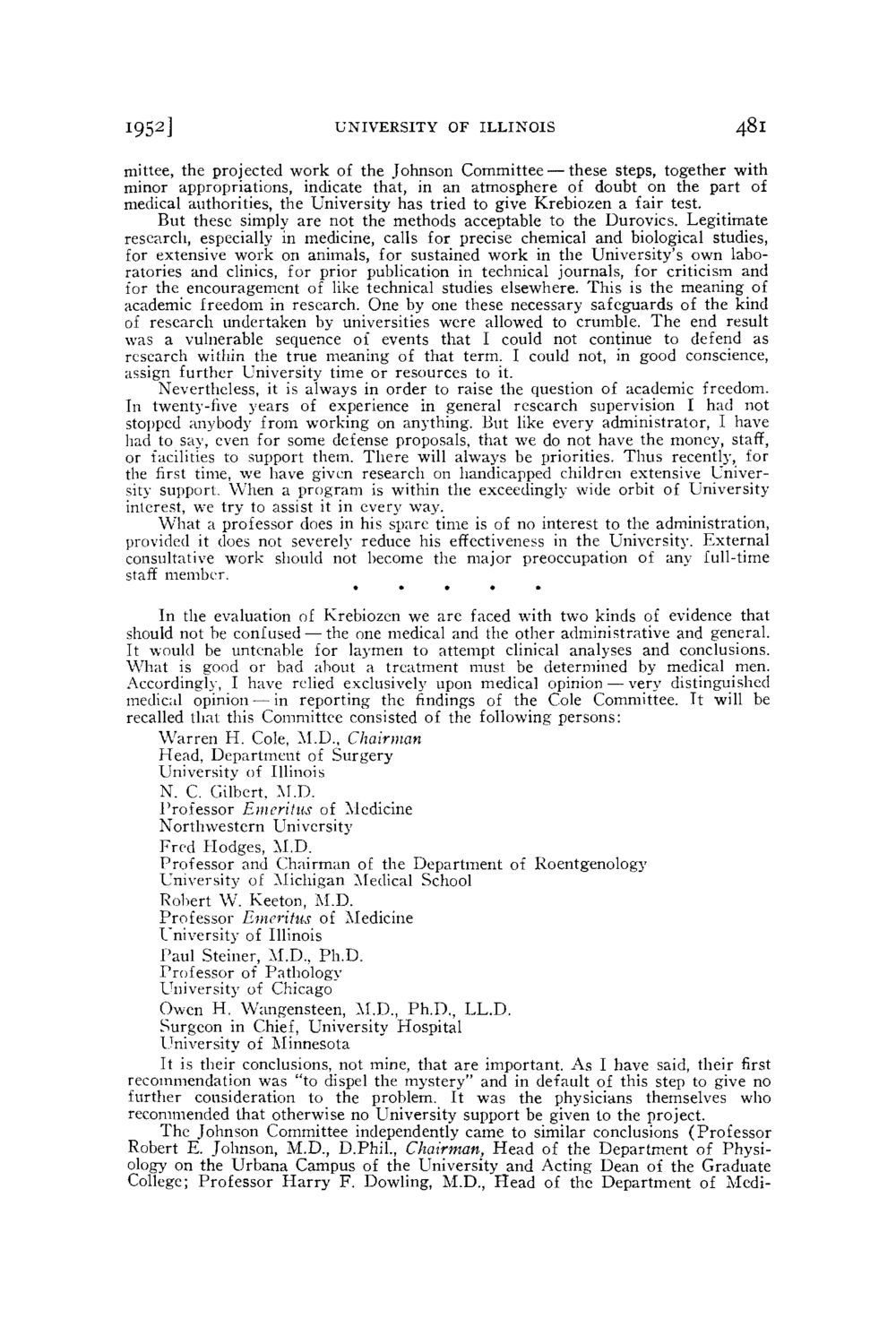| |
| |
Caption: Board of Trustees Minutes - 1954
This is a reduced-resolution page image for fast online browsing.

EXTRACTED TEXT FROM PAGE:
1952] UNIVERSITY OF ILLINOIS 48l mittee, the projected work of the Johnson Committee — these steps, together with minor appropriations, indicate that, in an atmosphere of doubt on the part of medical authorities, the University has tried to give Krebiozen a fair test. But these simply are not the methods acceptable to the Durovics. Legitimate research, especially in medicine, calls for precise chemical and biological studies, for extensive work on animals, for sustained work in the University's own laboratories and clinics, for prior publication in technical journals, for criticism and for the encouragement of like technical studies elsewhere. This is the meaning of academic freedom in research. One by one these necessary safeguards of the kind of research undertaken by universities were allowed to crumble. The end result was a vulnerable sequence of events that I could not continue to defend as research within the true meaning of that term. I could not, in good conscience, assign further University time or resources to it. Nevertheless, it is always in order to raise the question of academic freedom. In twenty-five years of experience in general research supervision I had not stopped anybody from working on anything. But like every administrator, I have had to say, even for some defense proposals, that we do not have the money, staff, or facilities to support them. There will always be priorities. Thus recently, for the first time, we have given research on handicapped children extensive University support. When a program is within the exceedingly wide orbit of University interest, we try to assist it in every way. What a professor does in his spare time is of no interest to the administration, provided it does not severely reduce his effectiveness in the University. External consultative work should not become the major preoccupation of any full-time staff member. In the evaluation of Krebiozen we are faced with two kinds of evidence that should not be confused — the one medical and the other administrative and general. It would be untenable for laymen to attempt clinical analyses and conclusions. What is good or bad about a treatment must be determined by medical men. Accordingly, I have relied exclusively upon medical opinion — very distinguished medical opinion — in reporting the findings of the Cole Committee. It will be recalled that this Committee consisted of the following persons: Warren H. Cole, M.D., Chairman Head, Department of Surgery University of Illinois N. C. Gilbert. M.D. Professor Emeritus of Medicine Northwestern University Fred Hodges, M.D. Professor and Chairman of the Department of Roentgenology University of Michigan Medical School Robert W. Keeton, M.D. Professor Emeritus of Medicine University of Illinois Paul Steiner, M.D., Ph.D. Professor of Pathology University of Chicago Owen H. Wangensteen, M.D., Ph.D., LL.D. Surgeon in Chief, University Hospital University of Minnesota It is their conclusions, not mine, that are important. As I have said, their first recommendation was "to dispel the mystery" and in default of this step to give no further consideration to the problem. It was the physicians themselves who recommended that otherwise no University support be given to the project. The Johnson Committee independently came to similar conclusions (Professor Robert E. Johnson, M.D., D.Phil., Chairman, Head of the Department of Physiology on the Urbana Campus of the University and Acting Dean of the Graduate College; Professor H a r r y F. Dowling, M.D., Head of the Department of Medi-
| |